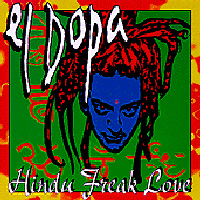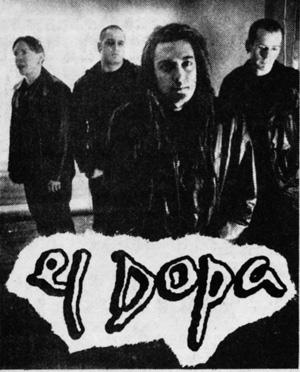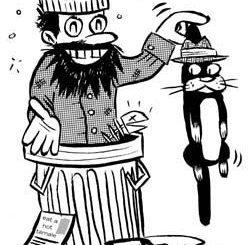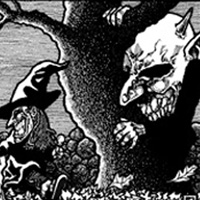 El Dopa
El Dopa
Hindu Freak Love
An interview with singer/programmer Krishna Venkatesh and bassist Alex Smoller
by Scott Hefflon
Few local bands can tell stories of opening for NIN or hanging with Lords of Acid and Smashing Pumpkins at some label party without a little flag going up saying “has-been.” When Think Tree broke up, both Boston and the nation lost an indescribably wild band. From the the murky shadows of that band came Krishna Venkatesh, now frontman of El Dopa. Dripping charisma both on and off stage, Krishna is a singer/performer who should’ve had a spotlight years ago. Not to put him on a “local rock icon” pedestal, he makes a fine example to point toward when “coaching” unsigned bands as to what is lacking in their own performance. El Dopa’s CD release thang at the Middle East was a packed house of who’s who.
Rather than stooping to a Meet & Greet, everyone I saw was almost as plastered as I was. We were all too busy scraping our faces off the back walls of the club to tell each other how great it was to see the other. El Dopa is heavy as fuck, with a flavoring of funk, a smattering of samples, and a buttload of energy and style.
Rather than foam at the word processor more than I have, I’ll let bassist Alex Smoller and Krishna tell the story.
The setting: The Middle East Cafe, date and time unknown, they drink Bass Ale. I drink water. We all smoke.
So tell me about your new CD, Hindu Freak Love.
Alex: It’s a seven song EP. When Think Tree broke up, Krishna started writing new material.
Krishna: It was something I was working on even before I left the band. Think Tree had nowhere else to go.
You were more in the background then. Now you’re very up front. That’s definitely the place for you.
Krishna: I like it there, brother. That’s part of why I left. I was itching… I wanted to get a band together. I knew Alex through his old band and Danny (Lee), the drummer, was in the same position in his band as I was in Think Tree. My brother (guitarist Arun Venkatesh) was graduating engineering school and I sorta convinced him to give up $40,000 a year for the starving life of the musician.
Alex: We’ve been recording this stuff for about a year, piece-mealing it when we could. We did radio and club tapes, but this is our first release as El Dopa. The first few shows we got were just, “Hey, you guys are from cool bands and we’re sure you’re doing something cool. Do this show.” Our first show was opening for Schooly D, that Philadelphia rap character. When we started off, we were doing more funk-oriented stuff.
 I knew you were funky and heavy, but I didn’t know how heavy your heavy was until I saw you live.
I knew you were funky and heavy, but I didn’t know how heavy your heavy was until I saw you live.
Krishna: That’s the direction we’re leaning towards. A lot of people are doing the funk thang. It just wasn’t our forte as a band.
Alex: We started off doing heavier shit as well. We all liked a lot of different styles of music and like playing a lot of different stuff. Krishna comes from a big jazz, and funk, and weird industrial stuff like Think Tree was.
Krishna: I made a conscious decision to kinda stay away from that (Think Tree art rock) stuff. In the beginning, we were kinda all over the place. We’d do a hip hop song and then a heavy song and then something with trumpet then something with five layers of guitars.
Alex: Finding that focus was a really crucial thing. It was hard booking shows ’cause people were like, “You do this stuff, you do that stuff, but where do you fit in?” We opened for De La Soul at MIT, and that was a fucked-up show. We came out and were doing this very heavy, sample-heavy shit. And we’re opening for the flower-hop thang. There were about 400 people there, you can see out about 50 people deep. People were giving us the finger and saying, “Get the fuck off the stage.” It turned out to be one of the coolest shows we’ve done, mainly because we were able to turn negativity around. By the end, people were into it. Krishna would say, “Do you eat the same food everyday? Do you eat, like hamburgers every day, day in day out? Or do you like to go have, maybe, Chinese food one day and then go have Indian food the other? Take it as that: Something different to check out, and possibly get off on.”
Krishna: Cool thing is, some of those people popped up at subsequent shows saying they liked what we were doing.
Alex: We were getting put on a lot of rap and funk bills, but then we’d turn and do an industrial, noisy thing, and it just didn’t fit. We liked all the different styles, but we really had to decide what direction we wanted to take it.
Because of the funk thang, do you guys ever slow it down and do the slacker-rap thing of, like, G. Love or Soul Coughing?
Alex & Krishna: No.
Krishna: We’re trying to make some kind of a statement. That’s the problem I’ve had with all the Weezers and stuff. It just doesn’t say anything to me. It’s just kinda there, like wallpaper. You look at it and say, “That’s pretty.” I’ve always thought that music should say something.
What does your music say, what do the lyrics say, and what are the differences from the old Think Tree days?
Alex: There’re always going to be some similarities ’cause it’s your thing. The sampling, the sequences and the weird sounds are still there; it’s just used in a more accessible pop way. Lyrically, there’s a lot of shit going on, a lot of pretty heavy issues. It’s not like you catch the guitar groove and then beyond that, it’s just, “Hey, I like to fuck chicks.”
Krishna: The record as a whole is a reflection of what I see and what I read with the paper. I don’t watch TV. We’re all vehemently opposed to television.
But you read ‘zines, right?
Alex & Krishna: Vehemently!
Alex: For a long time, there were very few ‘zines. They were either “professional” and reviewed shit no one cared about or they were gossip. In the last few years, ‘zines have popped up and done a lot of good.
Krishna: Covering national and local bands puts this scene in perspective. It’s not, “If we headline in Boston and win all the awards, we’re going to the top!” It’s a little more of a reality check.
I’ll save my whole rant on that for later. Back to TV. One thing I see is that while the effects and action are great, the plots are third-grade interactions. And the dialogue? It’s only one step higher than pornos. TV just really sells short the creativity of the writer and, well, of life.
Alex: People co-op this ideal, the TV scenario and try to make it their own.
Krishna: I get very disgruntled with the way it affects people. Like the Rollins thing when he talks about dealing with people that aren’t even up on their own shit, or on their potential. Your boss or the guy you’re trying to get car insurance from are being assholes because they’re acting so programmed. It’s a total drag to deal with.
How does watching an El Dopa show provide a more progressive mindset or have more spiritual enlightenment than watching, say, Melrose Place?
Alex: You’re out there with other people, getting drunk and maybe get laid… it’s human.
Krishna: You don’t have a perception being dictated to you.
Alex: It’s interactive, a group experience. That’s the thrill for me: Making sounds and people having an emotional reaction to them. TV’s not like that. Except I hear Spielberg’s coming out with this new thing where you can actually fuck your television.
Krishna: When I write lyrics or get on stage, I try to step outside the microcosm and say, “Is this a closed opinion or am I looking outside at the situation.” Except for when I’m drunk. Then I just am.
When you’re singing or moving on stage, you’ve always got to ask yourself if you’re doing it for your own psychic reward, or if you’re doing it to sell a single.
Krishna: I had trouble with that in the beginning. Using emotion as an instrument is different… If I’m not happening, it’s considered a shitty show, no matter how tight the band is playing.
Alex: Then again, this is a rock band and you can’t take yourself too seriously. You just get into it ’cause that’s what you love.
Krishna: I’m working on a new song, “Rock ‘n’ Roll is a Joke. Are You in on the Punchline?” This whole thing is a fucking joke. It’s also my business. It’s also what I want to do with my life.



